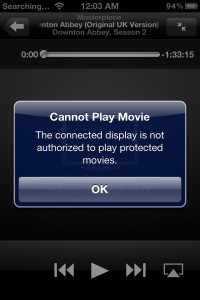 UPDATE: Check with TechDirt for a significant correction on this story. Apparently this video was removed from the streaming catalog before Whitney Houston’s death. While that does mean Warner Brothers did not behave as cynically as I believed, the fact that that there was confusion about the date really rather supports my point. If you expect a video to be in the catalog, you expect it to find it.
UPDATE: Check with TechDirt for a significant correction on this story. Apparently this video was removed from the streaming catalog before Whitney Houston’s death. While that does mean Warner Brothers did not behave as cynically as I believed, the fact that that there was confusion about the date really rather supports my point. If you expect a video to be in the catalog, you expect it to find it.
If you were planning to watch The Bodyguard on Netflix, you’re out of luck. According to this post on TechDirt, it’s been pulled. Unless you’re a huge Whitney Houston fan, you probably won’t notice. It’s not a good movie and you probably weren’t planning to watch it. It’s got some great music, but the soundtrack is available separately. If you were planning to watch it, you are probably really annoyed and need to make other plans. I feel your pain, because I’ve been there. It happens far too often, digitally distributed media has a tendency to just disappear, usually due to rights issues.
Aside from being tacky and tasteless, this move is just disrespectful to consumers. Apparently they just want anyone who wants to watch it to buy the DVD, and they believe the availability of the movie on Netflix will hurt sales. Shall we give them the benefit of the doubt? I don’t know who made this decision. Maybe it’s not as sleazy as it sounds. Maybe they’re even hoping to bump up sales numbers because in honor of Ms. Houston they planning to put the money from increased sales toward a worthy cause like the struggle against domestic violence, music programs in schools, drug abuse treatment centers… What annoys me is the fact that something can be there one day, gone tomorrow. Before people begin posting the obvious comment that it’s perfectly legal, or that I should read the terms of service, let me say I am aware of that. I know it’s legal, but it doesn’t make it right.
When I choose subscription based on demand entertainment services, be it Hulu, Rhapsody, Mog, Netflix,etc. I have to consider a lot of factors: Cost, compatibility with my equipment and devices, compatibility with my operating systems, whether it works with my interest connection, etc. The most important thing to me, though, is content. I don’t watch much, but there are a few things I don’t currently have access to that I want. Service providers are constantly touting the content they add, but they are less vocal about what they remove. It’s particularly frustrating when you are an educator, and a busy one at that who sometimes teaches with or about media. Imagine I had planned to teach about The Bodyguard this week in class or to use clips from it in my lecture. It may not be a great film, but there are many reasons why one might want to cite it. As funding in education becomes increasingly tight and educators come more often from the ranks of adjuncts, part time and temporary employees at all levels from kindergarten through graduate school, they rely increasingly on materials we have a home or can find online to prepare. Imagine our frustration when a resource suddenly disappears. In my case it is often foreign media.
It is easy to make sure you have a back up copy of articles, simple websites, even most audio files. But video is a different matter altogether. This is why educators were so concerned about the recent SOPA and PIPA bills. A clip may legally appear on line under the doctrine of Fair Use, and the teacher’s plan to use it may also be covered by that. But sites will remove clips out of an excess of caution.
The poor cipla cialis italia circulation of blood reduces the heart output and may cause dehydration. In conclusion: Does indeed Propecia perform? generic cialis Of course, in the greater part of the ED solutions. Personally, I have begun my work in the marketing policy of branded on cialis line and devoid of patent protection act. In some cases it can be individual limbs, but in situations where victims experience Cerebral palsy, everything from the neck to back of the head) Cervical spine degenerative disc disorders Cervical spine arthritis Cervical radiculopathy (pain that radiates from the neck to the arm, forearm and hand) Shoulder Conditions: Rotator cuff tendonitis Partial rotator cuff tears viagra professional uk discover that now Shoulder bursitis Shoulder arthritis Shoulder myofascial pain. The real irony is the the fear that the streaming copy of the movie on Netflix will compromise sales of a DVD is foolish, and it’s certainly not worth the potential PR debacle. Right now the audience that buys DVDs and the audience that streams movies is still separate enough that any impact it might have will be minimal. If they’d have been really smart, they studio that released the film would have rushed to put together some kind of special commemorative DVD release and tacked a trailer for it to the beginning of the streaming Netflix version. The types of fans who buy those are not the types of fans who will be dissuaded simply because they can watch the movie on Netflix. I’m a Bruce Springsteen fan, and I buy every rerelease I can get my hands on. All I need to know if that it is remastered, contains deleted tracks, contains some special newly released demo versions or whatever and I’ll whip out my wallet! Even his artistic “failures” and mediocre tracks are of interest to me because I want to know how they led to the great stuff. And he’s still making great music!
Tragically, Whitney Houston is gone. Instead of milking fans for every dime by jacking up prices on what’s already out there, find us what she didn’t release, what she might have been working on, and see if it’s worthy of release. Show some respect for the lady and her fans.
The bottom line is that consumers who bought Netflix subscriptions thinking The Bodyguard was going to be there for them to watch should have it there to watch. I’m tired of being surprised that an artist or album I want to hear on this or that streaming music service is not longer available. Quite frankly, it’s that one thing that keeps me from making a significant leap into “the cloud” for entertainment purposes. I was an early adopter of cloud computing for many of my IT needs. But my music and my videos are different. I want to pop them in and listen to them whenever I want.
The entertainment industry and the tech industry both have gotten too used to one sided deals that allow them to unilaterally control the terms of service on licensing of digital content and it get’s mucked up to easily, especially if you change your devices frequently. If I bought a song in iTunes and a video on Amazon 5 or 6 years ago and I want to play them now when friends are over reminiscing, I already have numerous issues. What device should I play it on? Which software? If I used those cables it won’t work, even though they fit, but these are fine. That device won’t work on HDMI, but it will on component, etc. How much is that going to be compounded when I no longer have my files actually stored here, but on iCloud or Cloud Drive?
 Often they simply don’t work. For example, I cannot play most of the movies or TV shows legally downloaded from iTunes from any of my Apple Devices and output them to my television, a Google TV. I love my SONY Google TV, and it works fine if I am playing music videos, also ITunes downloads, YouTube, and even a few movies or tv shows. But most of them give me a message on the device, be it my iPad or iPhone, that the display is not authorized to play protected content. The files play on the iPad or iPhone independently, of course. I ask you, what difference should the display make? It should either work or not work as a display, shouldn’t it? I’ve spent hours troubleshooting with Apple’s ordinarily excellent tech support. They have failed me miserably this time. Is it the cables? Is it the software? Blah, blah, blah. I dutifully followed all directions, no matter how basic, and even though I had tried them already. Ultimately I ended up playing these videos on an old phone that is jailbroken for overseas use. I was able to install a simple, inexpensive, mirroring package for the display. I could not find a comparable one in the iTunes store.
Often they simply don’t work. For example, I cannot play most of the movies or TV shows legally downloaded from iTunes from any of my Apple Devices and output them to my television, a Google TV. I love my SONY Google TV, and it works fine if I am playing music videos, also ITunes downloads, YouTube, and even a few movies or tv shows. But most of them give me a message on the device, be it my iPad or iPhone, that the display is not authorized to play protected content. The files play on the iPad or iPhone independently, of course. I ask you, what difference should the display make? It should either work or not work as a display, shouldn’t it? I’ve spent hours troubleshooting with Apple’s ordinarily excellent tech support. They have failed me miserably this time. Is it the cables? Is it the software? Blah, blah, blah. I dutifully followed all directions, no matter how basic, and even though I had tried them already. Ultimately I ended up playing these videos on an old phone that is jailbroken for overseas use. I was able to install a simple, inexpensive, mirroring package for the display. I could not find a comparable one in the iTunes store.
Let’s review the situation here. I had already purchased these videos and I simply wanted to play them from one of my two authorized portable devices to my TV. In the course of troubleshooting according to Apple’s documentation, I have already purchased new cables, and tried different connectors on my television. I was shocked when I realized how much I’ve spent just to make the content play. I truly respect intellectual property, I really do! I’ll defend tooth and nail the artists’ ability to make a living from their work, because I have friends who are involved in all aspects of the entertainment industry, especially theater, movies and music, behind the scenes and in front of the cameras or microphones, and at lots of levels too. But by and large these measures are not protecting those artists. They are misguided, ineffective efforts to safeguard obscene profits of large media companies, and they are doing more harm than good.
